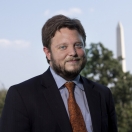
When the Vice President landed in Afghanistan yesterday, where he is spending most of the week, it was another chapter in the Vice President's role dealing with that country that has stretched not just throughout this Administation, but back to a visit nine years ago when the Taliban was first driven from power. Vice President Biden was there to get a first-hand assessment of progress on the ground as the United States continues to move towards empowering Afghanistan for full independence, and his remarks in a joint press conference with President Karzai told the story of this tough endeavor:
When I was last in Afghanistan just before our administration took office -- it was two years ago this month, and President-elect Obama asked me, as you recall, Mr. President, to once again get a firsthand look and have a discussion with you. And now since then we have with the leadership of my -- the team that's here on the right, the President’s team, we have a strategy and the resources in place to accomplish the goal of a stable and growing and independent Afghanistan able to provide for its own security, and in the process to be able to, at the same time, to disrupt and dismantle and defeat ultimately al Qaeda in Pakistan and the little appearance there is in Afghanistan.
A stable, sovereign Afghanistan that is not a haven for terrorists is critical toward that goal. And to that end we’re engaged in working -- and I had the opportunity to go to a training facility today -- working with your military to train up a first-class military organization that will be eventually in the position to meet all of the Afghan security needs. And toward that end I'd like to thank your Minister of Defense for taking me on the tour earlier today.
In the meantime our military is breaking the momentum of the insurgents and the radicalized portion of the Taliban. Our diplomats are working hard along with the President to promote regional cooperation, including with your neighbor, Pakistan.
And I want to recognize the contribution toward this effort over the past several years of a significant American diplomat who passed away, Ambassador Richard Holbrooke, who had unparalleled skills and tenacity that -- where he spent almost two years as our special representative to Afghanistan and Pakistan before he passed away last month.
And over the past two years the United States has sent some of America’s most capable troops into enclaves where -- that have long been operated -- the insurgency and the Taliban of being able to operate with impunity. And we’ve also substantially increased our civilian effort here in Afghanistan with diplomats and development experts side by side with our military and your soldiers and your police and your personnel, Mr. President. And as a result, I think it’s fair to say we have largely arrested the Taliban momentum here in some very important areas, particularly in Helmand and Kandahar.
But these gains, as you pointed out to me, Mr. President, as we know, are fragile and reversible. And as the President knows, sustaining them is going to require the Afghans to assume the responsibility for security and governance. And it’s going to require more pressure -- more pressure on the Taliban, from Pakistan’s side of the border, than we’ve been -- we’ve been able to exert so far. And there are many hard days that lie ahead.
But we know that in order to maintain the support and commitment of the people of Afghanistan and the American people, we must work with our Afghan partners to improve the provision of basic services, to promote transparency and accountability, to strengthen the institutions, and advance the efforts of reconciliation with the Taliban of which we spoke for some time; the Taliban who’ve rejected Al Qaeda and renounce violence and are prepared to embrace the Afghan constitution.
None of this, as the President has pointed out to me and we have discussed and we know, is going to be easy. But, Mr. President, in concert with your government and our NATO allies, we now have a viable path outline to move forward. And again, I'd like to compliment you publicly on Lisbon. I think it was a very, very useful conference, and I think we’re finally all on the same page.
And this year, NATO is going to begin to transition responsibility over the security in certain provinces to the government of Afghanistan, while the United States begins a condition-based reduction of our forces starting in July. And all of this will advance our shared U.S.-Afghani objective of having an Afghan National Security Force in the lead throughout all of Afghanistan by 2014, as President Karzai wisely proposed -- there was a first to move forward on.
Together, we will work on a framework for future bilateral relations and a lasting friendship with the Afghan people and the American people. And going forward, we’ll continue to train and advise the forces and to provide civilian assistance.
Let me say it plainly, Mr. President, it is not our intention to govern or to nation-build. As President Karzai often points out, this is the responsibility of the Afghan people, and they are fully capable of it. As President Obama said it in a slightly different way, he said, “It’s Afghans who must secure their country. And it’s Afghans who must build their nation.” And we stand ready to help you in that effort. And we will continue to stand ready to help you in that effort after 2014.


